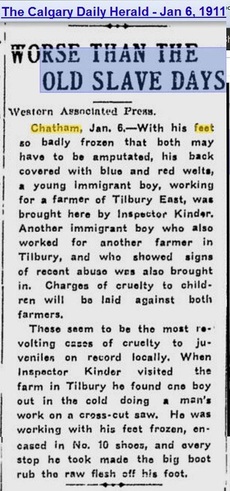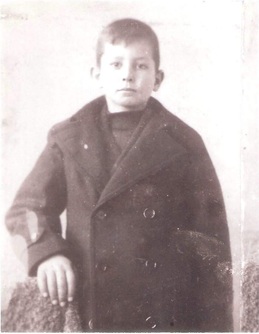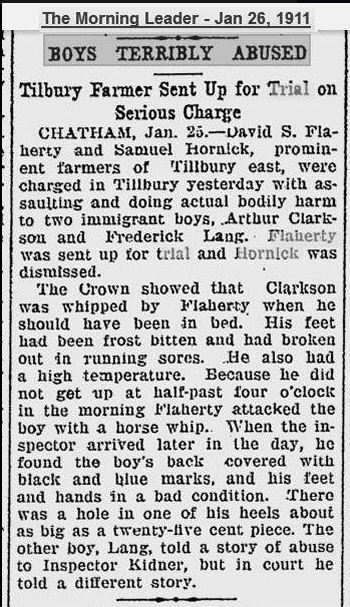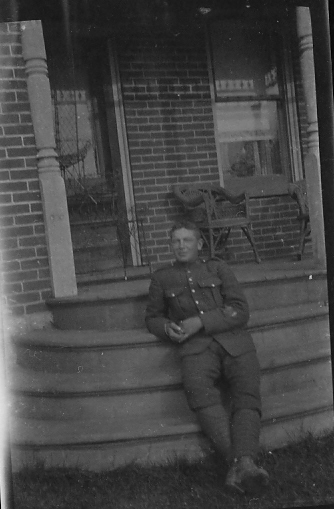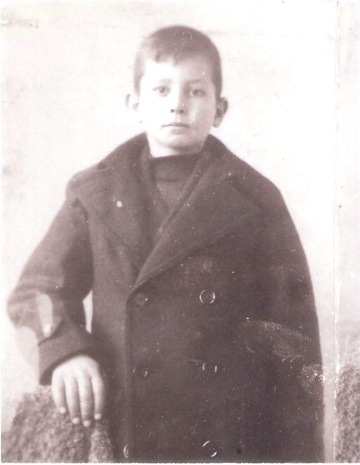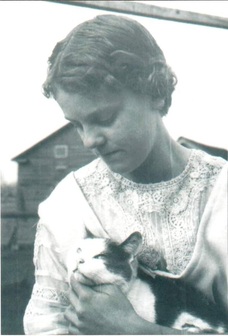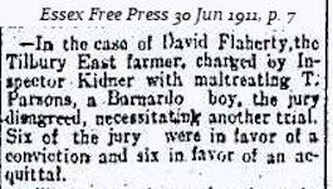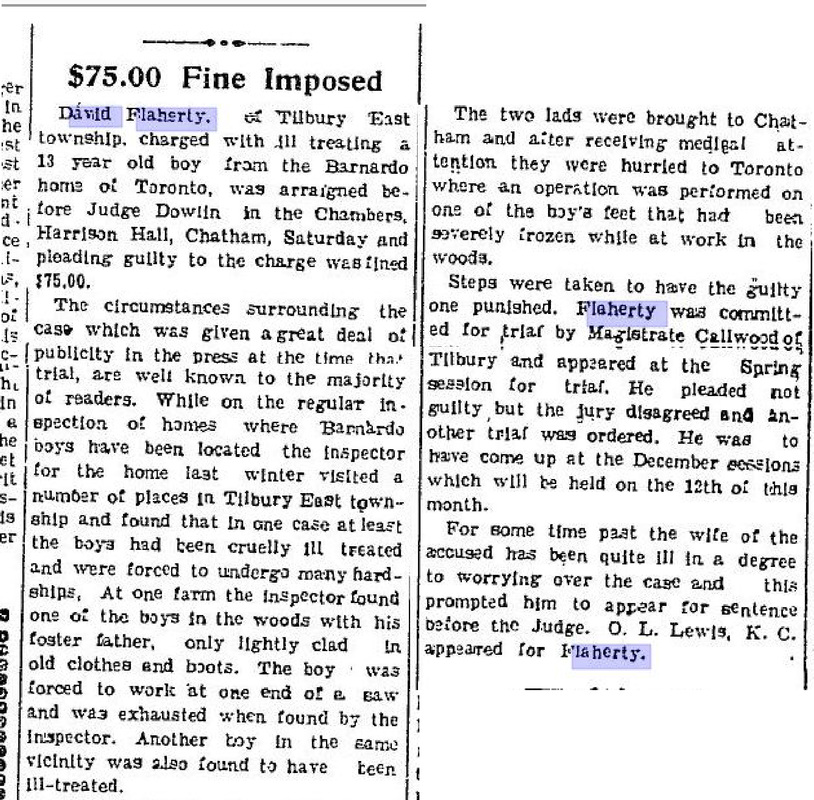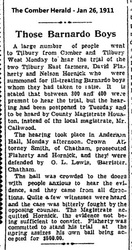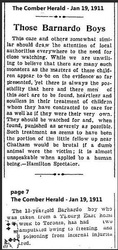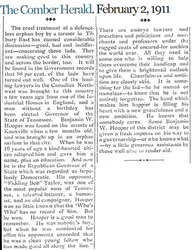Rising from the ashes of a terrible beginning
The story of British Home Children Arthur T Clarkson & Lily Ivy Agnes Wood
As told by their daughter Linda Clarkson Pagnani
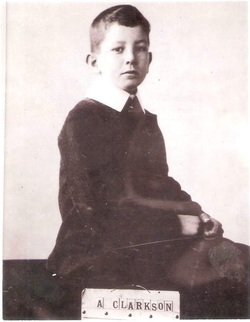
Admittance to Barnardo's photo
My Dad, Arthur Theodore Clarkson, was born in Bloemfontein South Africa on December 23,1897. His father, Arthur William Henry France Clarkson, was born into an upper middle-class English family that included a long-line of lawyers, ministers and military officers. His mother, Annie Maude Baker, was the daughter of a Norwich postal worker. The union of Arthur and Annie did not meet the approval of the Clarkson family and as a result Arthur W. H. was disowned. Arthur W.H. was an engineer who had gone to Africa to help design and build the first railroad line to transverse South Africa. Their first child, Norman Arthur France, was born in 1895. Shortly before my father was born Norman died, tragically crushed to death by a falling pile of lumber, Arthur W.H. and Annie's first son. Bloemfontein was in the Orange Free State which was the setting for many of the Boer War's bloodiest battles. Probably because of this, when Annie again became pregnant, she and little Arthur were sent back to her family in England. Their third son, Cyril Stuart Hill, was born in Norwich on Feb. 4, 1902. Annie returned to South Africa with her two little boys once it was safe to do so.
|
We don't know much about the family's life in S. Africa after the war, as Dad shared very little about his childhood in Africa. The event that was to change the family forever occurred in the spring of 1907, when my grandfather died of malaria. Alone and despondent in a land that was not her own, my grandmother and her two sons booked passage to return once again to England. Boarding the ship that would take them home, Annie was in an extremely fragile emotional state, and my father was told to "watch over your Mother and little brother". 9-year-old boy that he was, Dad took this admonishment completely to heart and believed even after arriving back in England that it was his duty to safe-guard his Mother and brother's well-being. So seriously did he feel this responsibility he often left his school in the middle of class in order to run home and make sure that his family was safe. Sadly, this behaviour was judged incorrigible, and he was sent to a home for "wayward" boys. He was eventually sent from that home to an orphanage in Surrey and from there he was sent out to Canada. We don't know if his mother actually signed the release for him to be sent out of the country, but considering the state of her mental health, she may have done so without knowing what she had signed. How ever it may have happened, this well-loved little boy was shipped off to a place where no loving home awaited him. What was in store for him instead was brutally hard work and inhuman treatment by those to whom he had been entrusted.
|
|
|
He was sent to work for farmer David S. Flaherty of Tilbury in September, 1909. He remained there until January, 1911 when he was removed from the Flaherty farm because of the severe abuse he suffered there. The only account of this he ever gave to us was that he had to sleep in the barn with had no covering at the window and no heat. He said the snow would blow in through the window opening and lay across the foot of his bed through the night. Because of this exposure, his feet were badly frost-bitten. This caused his feet to swell to the point that he could no longer get his boots on and he worked for a time in his bare feet. Eventually Flaherty gave him a pair of his own boots which were, of course, many sizes too large. Instead of helping the situation the oversized boots chaffed against Dad's already severely damaged feet. When his condition was discovered, he was removed from the farm and hospitalized and his abuser was brought up for trial. The damage to his feet was so severe that at first it was feared that amputation might be required. Thankfully that was never necessary and he kept his feet, and although they were quite badly deformed, they served him well for the rest of his life.
|
|
Exactly how long his recovery took is unknown, but in August of 1911 he was apparently again physically able to work and he was placed in the employ of another area farmer, who spoke highly of him in his reports. He remained at that farm until 1913 when he was employed by Francis E. Brown of Tweed. His employment with the Browns finally gave him a chance to realize the one goal he had had since first arriving Canada and that was to somehow save enough money so that he could send for his mother and younger brother to join him. The devastation he must have felt when , in 1914, he learned that his mother had died in England of an overdose of Laudanum that was presumed deliberate. (My Dad never shared the details of his mother's death with any of his family. It was only through my own family research that it was discovered. I'm sure Dad believed he had failed his mother - a belief which must have caused him great sorrow and shame, even though it wasn't true.) Dad remained with the Browns until 1916 when he enlisted in the Canadian Army Signal Corps. By Sept. 1917 he was in France where he served 10 months in the trenches before suffering appendicitis. He had an emergency appendectomy done in a hospital tent in the field of battle (and without anaesthesia) and was then sent to a convalescent hospital in England. Some months later he was sent home to Canada. |
Lily Ivy Anges Wood
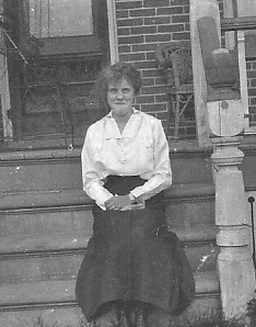
Lily Ivy Anges Wood
Dad's employer, Francis Brown, had a sister whose married name was Newton. Mr. & Mrs. Newton had a farm near Tweed. My Mom, Lily Ivy Agnes Wood, was their hired girl. Mom was sent to Canada in 1911. Her mother died when Mom was three years old and Mom was sent to live with her paternal grandmother and maiden aunts in Manchester . Mom was as talkative as Dad was quiet and an ardent storyteller. We grew up laughing and crying over the stories of her childhood. Her grandmother was a stern and deeply religious woman who had given birth to 14 children and managed to raise 9 of them to adulthood. One of the two aunts who lived with Mom and her grandmother was very kind - the other the complete opposite. It was a great sorrow for my 7-year-old Mom when her "good" aunt died. Mom told of having to peel potatoes and having to eat the cooked peels if she cut them too thickly. She told of a Christmas when, because she had misbehaved, she was shown the presents that she would have received if she had behaved, and then got a stocking stuffed with coal on Christmas morning.
Mom was only allowed to read the Bible or Pilgrim's Progress. Already an avid reader and hungry for more variety, she once borrowed a book from a school friend. She used to sneak "down the yard to the privy" to read the forbidden book only to be discovered by her vengeful grandmother, who promptly destroyed the book. The loss of that borrowed book caused Mom to lose "one of the only real friends I had ever had". Despite behaviour which sounds like cruelty, Mom always said her grandmother loved her and was good to her in many ways. Because of her advancing age (and the constant prompting of the remaining maiden aunt who resented having to help feed and clothe "the wretched child), Mom's grandmother made the decision to place Mom in Rosen Hall as Home for Girls in Manchester. This decision was hard on Mom's grandmother, who often walked miles to visit her in the home. Not surprisingly, Mom was not happy in the home and so decided, on her own, to volunteer to be sent out to Canada. Her grandmother at first refused to give her permission for Mom's emigration, but she was eventually persuaded to sign the consent papers.
Mom arrived at the Marchmont Home in Canada on May 14, 1911. By May 16 she had been sent to work for a Mrs. Peppiot, whose first reports about Mom were full of praise. But by winter of that year Mrs. Peppiott reported that Mom had run away once and was "acting strangely" ever since. Mom was removed from the Peppiott home on January 2, 1912. As forthcoming as Mom always was about sharing her "stories", she would never give any details about this episode, but she often mentioned that some of the men where she worked were not "good". In later years, we have come to believe that she was probably subjected to sexual abuse, and perhaps by more than one employer, since she later asked to be removed from another farm owned by a Mr. Buck. When asked outright about abuse, Mom would just say it didn't bear talking about and she was just "glad I survived". Her final placement was on the Newton farm in 1914. She was happy there (although she said she worked like a mule), and the Newton family was pleased with her. She came to consider the Newtons her "family" and she and my father continued to visit them several times a year until the Newtons passed away.
While working at the Newton farm she met my Dad - who she "wasn't very impressed by". He however must have been immediately smitten and continued to call on Mom whenever he could until he entered the Canadian Army in 1916. Mom wrote to him while he was away in the Army and when he returned home to Canada he proposed. After his proposal had been made and accepted, Dad sent his younger brother Cyril the passage money to travel to Canada. Cyril arrived in time to "stand up" with Mom and Dad when they were married on March 7, 1919 at Sydenham United Church in Kingston. Looking forward to making a new life in Canada, Cyril traveled to Western Canada where he heard there was a need for good workers. Sadly, he drowned in British Columbia in 1920. Brother Cyril became yet another subject that Dad never talked about.
Mom was only allowed to read the Bible or Pilgrim's Progress. Already an avid reader and hungry for more variety, she once borrowed a book from a school friend. She used to sneak "down the yard to the privy" to read the forbidden book only to be discovered by her vengeful grandmother, who promptly destroyed the book. The loss of that borrowed book caused Mom to lose "one of the only real friends I had ever had". Despite behaviour which sounds like cruelty, Mom always said her grandmother loved her and was good to her in many ways. Because of her advancing age (and the constant prompting of the remaining maiden aunt who resented having to help feed and clothe "the wretched child), Mom's grandmother made the decision to place Mom in Rosen Hall as Home for Girls in Manchester. This decision was hard on Mom's grandmother, who often walked miles to visit her in the home. Not surprisingly, Mom was not happy in the home and so decided, on her own, to volunteer to be sent out to Canada. Her grandmother at first refused to give her permission for Mom's emigration, but she was eventually persuaded to sign the consent papers.
Mom arrived at the Marchmont Home in Canada on May 14, 1911. By May 16 she had been sent to work for a Mrs. Peppiot, whose first reports about Mom were full of praise. But by winter of that year Mrs. Peppiott reported that Mom had run away once and was "acting strangely" ever since. Mom was removed from the Peppiott home on January 2, 1912. As forthcoming as Mom always was about sharing her "stories", she would never give any details about this episode, but she often mentioned that some of the men where she worked were not "good". In later years, we have come to believe that she was probably subjected to sexual abuse, and perhaps by more than one employer, since she later asked to be removed from another farm owned by a Mr. Buck. When asked outright about abuse, Mom would just say it didn't bear talking about and she was just "glad I survived". Her final placement was on the Newton farm in 1914. She was happy there (although she said she worked like a mule), and the Newton family was pleased with her. She came to consider the Newtons her "family" and she and my father continued to visit them several times a year until the Newtons passed away.
While working at the Newton farm she met my Dad - who she "wasn't very impressed by". He however must have been immediately smitten and continued to call on Mom whenever he could until he entered the Canadian Army in 1916. Mom wrote to him while he was away in the Army and when he returned home to Canada he proposed. After his proposal had been made and accepted, Dad sent his younger brother Cyril the passage money to travel to Canada. Cyril arrived in time to "stand up" with Mom and Dad when they were married on March 7, 1919 at Sydenham United Church in Kingston. Looking forward to making a new life in Canada, Cyril traveled to Western Canada where he heard there was a need for good workers. Sadly, he drowned in British Columbia in 1920. Brother Cyril became yet another subject that Dad never talked about.
|
Dad's school days ended with his arrival in Canada and he was ashamed of his lack of education and vowed he would do something about it one day. After entering the Army, he was finally able to afford to enroll in a correspondence school. He continued the correspondence courses throughout his time in the military and after he returned home. Because of the courses, he was hired to work at the power facility in Kingston Mills. He and Mom moved into a tiny rented house overlooking the Rideau Canal. Their first child, Arthur Norman, was born there in December, 1919. Another son, James Lionel, came along in May of 1921 and their first daughter, Doris Gertrude, in November, 1922. Anxious about supporting his growing family, and hearing that in the US Henry Ford was promising "five dollars a day" to new workers, Dad decided it was time to leave Canada. In the spring of 1923, leaving his family behind, Dad traveled to Detroit, Michigan, and was hired by The Ford Motorcar Company. Mom and her three little ones followed several months later and the family settled into a rented house in Detroit. Thanks to his increased income and frugal habits, it wasn't long before Dad was able to buy a lot in a Detroit suburb.
|
By November 1924 he had built a small home where their fourth child, Gladys Leila, was born. Dad realized his family would soon outgrow the "little house" , so he began building a much larger house on the property. The new home was completed just in time for the birth of daughter Ruth Elaine on October 1, 1926.
The family's relative prosperity didn't last, however. When daughter Shirley Jean was born on August 1930, Dad found himself with no job, a mortgage to pay a wife and six children to feed. The hard times of the depression defeated many men who simply gave up looking for work and left their families to fend for themselves. Luckily Dad wasn't one to surrender to anything. He worked doing whatever work he could get, sometimes working two and even three or four jobs at a time so his family could survive. Keeping a roof over their heads was another problem and Dad dealt with it in his usual determined way. He wrote to the man who held the mortgage on their house asking him to accept interest payments only until he could afford to make full payments, explaining that if the house was repossessed, they would both be losers. The gentleman saw the wisdom in the proposition and having confidence that Dad would do exactly as he said he would, he accepted the interest only offer and the family home was saved. By the time the seventh and last child, Linda Dianne was born in 1941, Dad had a secure job working for the Detroit Edison Co. as an electrician (self-taught) where he remained until 1963 when a heart attack forced him into retirement. Although reluctant to give up working, Dad eventually learned to enjoy his leisure years. He kept busy with his hobbies of amateur radio and gardening, and spent time with his many friends. He died of a stroke in September, 1973, a few months short of his 76th birthday.
Mom lived on in the family home for another 7 years before moving to a smaller house to be nearer her daughters. After being married for more than 50 years, adjusting to a life alone was not easy for her, but she carried on with a resolve and acceptance that was typical of her nature. Her education had also stopped when she left England, but she was a voracious reader and accumulated an amazingly wide range of knowledge. She was a great cook and especially loved to bake. She was never without a book or a hand-work project. Every baby born into the family went home from the hospital in a sweater and bonnet she had made. Before she died she made and stored away such a quantity of baby layettes that every great grandchild born also wore one of her creations! Mom remained mentally sharp, following the political news devotedly and working crossword puzzles almost until the day she died in June 1987, 12 days before her 91st birthday.
Many of the children who were sent out to Canada as part of the Home Children Diaspora were unloved or unwanted orphans who hoped the life they were going to would be better than the one they left behind. Sadly this was often not the case, and it was not the case, at first, for either of my parents . They left people who loved them but couldn't care for them and went to live with people who neither loved or took care of them and, in fact, were often cruel. They left large extended families back in England, but in their new lives they were completely alone. But somehow, as bereft of kindness as those earlier days were, they never forgot the meaning of love. And tempered in the fire of their bad beginning in Canada, they found the strength, faith and courage to create a large, devoted family. Two lonely, sad children became the roots of a family tree which includes seven children, 16 grandchildren, 32 great grandchildren, 17 great great grandchildren and 2 great great great grandchildren. Most of the members of this amazing family still live in Michigan not more than 50 miles from the family homestead. The entire "clan" manages to get together once a year at Christmas. Most importantly, we all love and respect one another - thanks to a Mother and Father who taught us, by example, not only how to build a family but how to truly appreciate having one.
The family's relative prosperity didn't last, however. When daughter Shirley Jean was born on August 1930, Dad found himself with no job, a mortgage to pay a wife and six children to feed. The hard times of the depression defeated many men who simply gave up looking for work and left their families to fend for themselves. Luckily Dad wasn't one to surrender to anything. He worked doing whatever work he could get, sometimes working two and even three or four jobs at a time so his family could survive. Keeping a roof over their heads was another problem and Dad dealt with it in his usual determined way. He wrote to the man who held the mortgage on their house asking him to accept interest payments only until he could afford to make full payments, explaining that if the house was repossessed, they would both be losers. The gentleman saw the wisdom in the proposition and having confidence that Dad would do exactly as he said he would, he accepted the interest only offer and the family home was saved. By the time the seventh and last child, Linda Dianne was born in 1941, Dad had a secure job working for the Detroit Edison Co. as an electrician (self-taught) where he remained until 1963 when a heart attack forced him into retirement. Although reluctant to give up working, Dad eventually learned to enjoy his leisure years. He kept busy with his hobbies of amateur radio and gardening, and spent time with his many friends. He died of a stroke in September, 1973, a few months short of his 76th birthday.
Mom lived on in the family home for another 7 years before moving to a smaller house to be nearer her daughters. After being married for more than 50 years, adjusting to a life alone was not easy for her, but she carried on with a resolve and acceptance that was typical of her nature. Her education had also stopped when she left England, but she was a voracious reader and accumulated an amazingly wide range of knowledge. She was a great cook and especially loved to bake. She was never without a book or a hand-work project. Every baby born into the family went home from the hospital in a sweater and bonnet she had made. Before she died she made and stored away such a quantity of baby layettes that every great grandchild born also wore one of her creations! Mom remained mentally sharp, following the political news devotedly and working crossword puzzles almost until the day she died in June 1987, 12 days before her 91st birthday.
Many of the children who were sent out to Canada as part of the Home Children Diaspora were unloved or unwanted orphans who hoped the life they were going to would be better than the one they left behind. Sadly this was often not the case, and it was not the case, at first, for either of my parents . They left people who loved them but couldn't care for them and went to live with people who neither loved or took care of them and, in fact, were often cruel. They left large extended families back in England, but in their new lives they were completely alone. But somehow, as bereft of kindness as those earlier days were, they never forgot the meaning of love. And tempered in the fire of their bad beginning in Canada, they found the strength, faith and courage to create a large, devoted family. Two lonely, sad children became the roots of a family tree which includes seven children, 16 grandchildren, 32 great grandchildren, 17 great great grandchildren and 2 great great great grandchildren. Most of the members of this amazing family still live in Michigan not more than 50 miles from the family homestead. The entire "clan" manages to get together once a year at Christmas. Most importantly, we all love and respect one another - thanks to a Mother and Father who taught us, by example, not only how to build a family but how to truly appreciate having one.
Arthur & Lilly's daughter Linda's thoughts after reading this verdict, finally, in August of 2012:
"After reading it I at first felt quite bitter that the man who hurt my Dad seems to have gotten off with a mere slap on the wrist - although $75.00 was a considerable sum back then. Then I started thinking about the fact that my Dad, in the few times the incident was ever mentioned, never expressed any hatred or bitterness for Flaherty and I realized yet again what a truly good man my father was. Carrying around hatred all those years would have only weighed my Dad down and accomplished nothing good for anyone. "
"After reading it I at first felt quite bitter that the man who hurt my Dad seems to have gotten off with a mere slap on the wrist - although $75.00 was a considerable sum back then. Then I started thinking about the fact that my Dad, in the few times the incident was ever mentioned, never expressed any hatred or bitterness for Flaherty and I realized yet again what a truly good man my father was. Carrying around hatred all those years would have only weighed my Dad down and accomplished nothing good for anyone. "
Essex Free Press 30 Jun 1911
(note the misspelling of Arthur's name)
The Comber Herald (Comber, ON), December 7, 1911
please click on thumbnail to view
